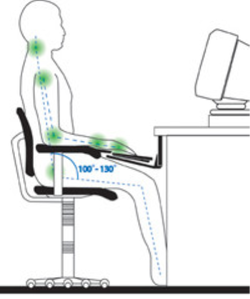|
by Louise I want you to imagine being alive...well...about a million years ago. Are you picturing yourself huddled in a cave? Worried about not having showers or new clothes? What do you think you'd be doing for most of the day?  When most people picture life a million years ago, they picture cave-dwelling, dirty Neanderthals who spent their days hunting, fighting, and grunting. And - to be fair - that's not a completely inaccurate picture of what life was probably like. What could we possibly learn about being healthy and lean from such savages? The Answer: A whole lot more than you might expect. Here's the deal: Evolution is an incredibly slow process. Slower than you think. This is really important, because it means that those "savages" that lived a million years ago - well, they weren't all that different from you or me. The humans who survived were those who were well adapted and adjusted to their environment, their diet, and their lifestyle. Consequently, they've got a few things to teach us about how to be healthy and how to keep our bodies looking good (after all, you couldn't run away from predators if you had to lug around a bunch of belly fat). So what was life like for them:  1. What'd They Eat? A million years ago, you spent pretty much every day either hunting for food or else walking around gathering small bits of food. You'd come across a few plants here and there and occasionally some berries that were not poisonous to eat. Mostly, though, you'd look for animals that you could eat (while avoiding animals that might eat you!). Humans lived this way for millions of years. During that time, our genes mutated through the evolutionary process so that the humans who survived were those who were able to stay healthy and lean on the most commonly available foods (i.e., all parts of animals, green leafy vegetables, a few tubers, a sprinkling of nuts and seeds, and occasionally some fruits). What does this tell us? It tells us that our bodies have been programmed, for millions of years, to thrive on meats, vegetables, and a spattering of nuts, seeds, and fruits. Lesson #1: Stick to Vegetables and Meats.  2. Did They Exercise? Living a million years ago doesn't sound like a very appealing life to most of us. I mean, for a start, there was no Facebook and no Downton Abbey! So what'd they do with all that free time? Did our ancestors go for morning jogs and afternoon yoga? Not really, but they did move quite a lot. Cavemen didn't sit around all day in front of a computer - they walked a lot, sprinted when necessary, and often lifted heavy carcases and rocks. It shouldn't come as a surprise to us, then, that we often develop many physical problems from sitting hunched over all day. It's not something our bodies ever evolved to do. For you and me, it would be pretty difficult and not very feasible to move around all day and occasionally lift heavy dead animals. However, it is possible for us to increase the amount of time we spend walking rather than driving, and it's entirely reasonable to get some dumbbells to use at home. Lesson #2: Move as often as possible. Run really fast from time-to-time and lift heavy things (safely).  3. I Bet They Partied All Night. Honestly, if you were living a million years ago, you didn't need to get up every morning to go to work. Surely, nights around the campfire (at least when humans were able to control fire about 800,000 years ago) must have been wild and rowdy? Well... There's not much you can do in the middle of the night in the middle of the forest, jungle, or wherever you're living. In all likelihood (and this is harder to prove than diet or exercise), our ancestors went to sleep shortly after it got dark and woke up with the rising sun. And you know what they didn't have? Streetlights shining at them all night. To state the obvious, sleep is important for humans, and our bodies are programmed to sleep when it's dark. If you live in the far north, where you get little sunlight during the winter months, you'll more often be tired during that season. Light disturbs our sleep even though you might not realize it. Unless you live in the countryside without any street lamps shining into your bedroom, a dark curtain should keep it dark enough for you to gain truly restful sleep. Lesson #3: Get More Sleep. Block out as much light as possible when you sleep.  4. Worrying About Getting Eaten By Predators Must Have Been Really Stressful... Whenever people talk about life a million years ago, the conversation invariably turns to how terrible it must have been to try to keep from being eaten by bears, lions, and other dangerous animals. And clearly, actually getting eaten by a bear was a pretty bad thing. But how often do you think humans actually found themselves in grave danger? Once a month? Maybe once a week at most? The point is that humans a million years ago were very stressed, but only every once in a while. Today, we worry about our jobs, our health, and everything else in our lives pretty much all day every day. And I, as much as anyone else, know exactly how hard it is to stop worrying and stressing. However... Our bodies didn't evolve to be able to handle chronic stress. It may seem like sudden and intense stress would be worse, but it's the chronic stress that leads to a host of health problems from continual release of stress-related hormones. As important as nutrition, exercise, and sleep are, chronic stress may play an even larger role in our overall health and weight (after all, hormonal imbalances can often cause weight gain). Lesson #4: Chill Out. Find ways to unplug and de-stress. Our genetic make-up is not all that different from our cavemen ancestors, but we have changed our habits dramatically. Although we can't (and probably don't want to) turn back the clock to prehistoric times, we can still follow a few simple rules that will enable us to live in conditions more suited to our bodies. So, eat nutritious foods, walk more, sleep more, and chill out! I'd love to hear feedback from you! Have you ditched all those sugars or started moving more and felt different or better as a result? How else do you think we modern humans are making it tougher for ourselves? Let me know in the comments below! Louise regularly blogs at locarbolicious.com.  Although your personal finances and your business success are my primary interest, I believe you only operate at peak efficiency when you're fit and healthy. If you feel good, it filters through to your work. To help you with that, click for your free ebook: The Quick Guide to Sexy
0 Comments
Leave a Reply. |
By Heather
|
Heather Katsonga-Woodward, a massive personal finance fanatic.
** All views expressed are my own and not those of any employer, past or present. ** Please get professional advice before re-arranging your personal finances.
 RSS Feed
RSS Feed


